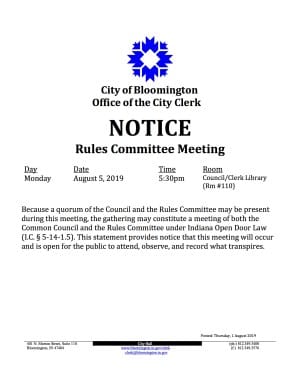City Council’s rules committee makes council personnel a top priority

At the first substantive meeting of the Bloomington city council’s rules committee on Friday, a few priorities were identified for future work.

The four top priorities are: the council’s personnel; meeting procedures, including time limits; a council policy manual; and a clean-up of city code on boards and commissions.
Those items were identified by the four-member committee, which now consists of Steve Volan, Isabel Piedmont-Smith, Jim Sims and Dorothy Granger. Granger is the council’s vice president. She was added to the committee by the council’s president, Dave Rollo, in the week since the rules committee’s first attempted meeting.
Personnel was elevated to top priority for the committee’s next meeting, because council administrator/attorney Dan Sherman is hiring a deputy administrator/attorney to fill a recent vacancy. And Sherman is planning to retire sometime in the next several months.
Councilmembers at Friday’s committee meeting were keen to have some input on the hire of Sherman’s deputy. They also said they wanted Sherman to be the one who makes the decision.
From the job description for Sherman’s deputy: “Drafts and presents ordinances, resolutions, contracts, press announcements and background information, and other documents. Researches legal and policy issues and provides resources, information, advice, and recommendations.”
Granger told committee members that she and Rollo, as president and vice president of the council, had met to talk about the relationship between the council’s support staff and the clerk’s office.
The committee took two votes on Friday, to appoint a chair and a secretary, after a nudge from ex officio member of the committee, Nicole Bolden, who’s the city clerk. Bolden pointed out that it’s important for committee members to know who’s responsible for maintaining a record of the meeting as required by Indiana’s Open Door law.
Committee members voted to appoint Volan as chair and Bolden as the person responsible for maintaining the memos about meetings.
Indiana’s Open Door statute doesn’t require “minutes” to be kept, but does say that a memo must be created that includes specific pieces of information:
IC 5-14-1.5-4
Posting agenda; memoranda of meetings; public inspection of minutes
Sec. 4 (b)
(1) The date, time, and place of the meeting.
(2) The members of the governing body recorded as either present or absent.
(3) The general substance of all matters proposed, discussed, or decided.
(4) A record of all votes taken by individual members if there is a roll call.
(5) Any additional information required under section 3.5 or 3.6 of this chapter or any other statute that authorizes a governing body to conduct a meeting using an electronic means of communication.
(c) The memoranda are to be available within a reasonable period of time after the meeting for the purpose of informing the public of the governing body’s proceedings. The minutes, if any, are to be open for public inspection and copying.
The prioritization of meeting procedure by the rules committee stems from a concern about the length of council meetings, an issue that has persisted at least a few years.
On Friday, committee members talked about the change to their meeting start times—enacted by the council in late 2016—from 7:30 p.m. to 6:30 p.m. That change meant that the loose time limit on meetings provided by the council’s so-called “10:30 rule” was no longer three hours. The “10:30 rule” says that legislation can’t be introduced after 10:30 p.m. local time without a 2/3 majority vote of the council.
The council’s vote to begin its meetings an hour earlier came at its Nov. 16, 2016 meeting. Deliberations on that question began at 1:13 a.m., according to the meeting minutes. The minutes indicate some friction among councilmembers about the issue.
From the minutes: “Chopra said that the behavior of councilmembers and effects of the late meeting proved the need for the ordinance. She said that the reason for the ordinance [which started meetings an hour earlier, at 6:30 p.m.] was that meetings often ended very late.”
From later in the minutes: “Volan said … he was concerned that even the change in start time would not shorten meetings, and urged everyone to show more respect.”
Of the 18 council meetings reviewed by The Beacon for the first half of 2019, seven have lasted longer than three hours and another three have lasted at least 2 hours and 55 minutes.
Among the procedural changes that the rules committee might consider recommending are time limits for councilmember speaking turns and for those who make presentations to the council.
The committee’s next meeting is scheduled for 8 a.m. on Aug. 15.




Comments ()